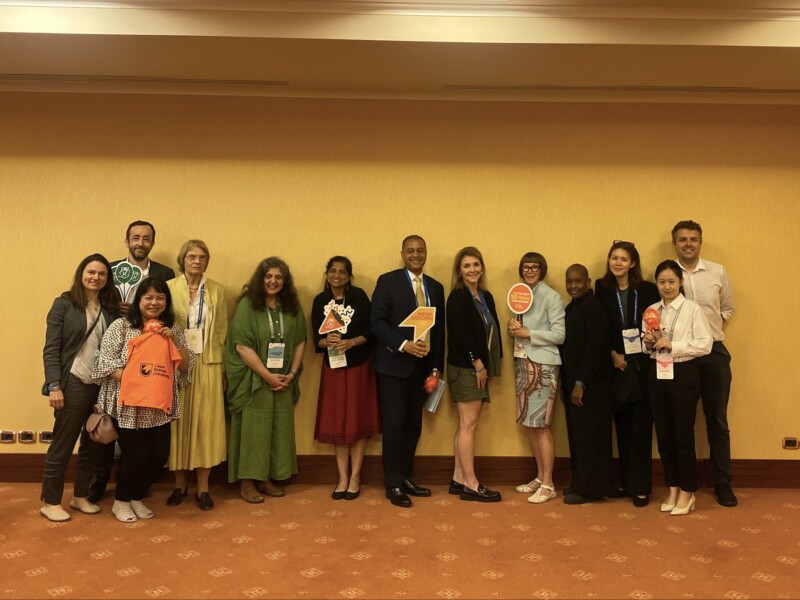Dr. Lynn LeVatte: Presenting CBU’s Education Programs through a Montessori Vision
Earlier this spring, Dr. Lynn LeVatte, Assistant Professor of Education at Cape Breton University, had the honour of speaking at the Montessori Model United Nations (MMUN) Conference held in Rome. This conference brought together students, parents, educators, thought leaders and members of the United Nations from around the world to discuss innovative approaches to Montessori education.

Dr. Lynn LeVatte (6th from the right) and Judith Cunningham (5th from the right, MMUN’s Executive Director) in a group photo at the conference.
With the mission to inspire and empower youth, MMUN offers a year-long program that enables students in upper elementary and middle schools to learn about the operations of the United Nations and its role as the world’s largest international peacekeeping and humanitarian organization. This year, the program sees more than 800 students participating.
Reflecting on her experience, Dr. LeVatte shares, “Presenting at the conference was a wonderful opportunity to showcase inclusive education practices for teacher training which is occurring within the Education programs at CBU.” Her presentation focused on transformational education and inclusive practices at CBU and how our Bachelor and Master of Education programs align seamlessly with the Montessori model and the United Nations Sustainable Development Goals.
The Department of Education at CBU offers concentrations in L’nu/Indigenous Education and Education for Sustainability within the Bachelor of Education (B.Ed.) program, along with the Master of Education in Sustainability, Creativity and Innovation (MEd SCI). “Connecting our work at CBU with the United Nations firsthand was extremely valuable to me as an educator, and also in sharing international-scale programming that aligns with the United Nations’ work,” Dr. LeVatte says. “We have many things in common and many future possibilities to explore.”
Students in CBU’s B.Ed. program have several practicum options, including placements in public or private schools. Some students opt for private schools, such as Montessori, and find great value in the unique educational approach they offer. The experience helps them to better understand the Montessori methods and how they align with Nova Scotia’s new Inclusive Education Policy. “The policy follows a framework guided by universal design for learning, which has been evident in the Montessori method for many years, such as community collaboration, relationship building, independence fostering and belongingness,” Dr. LeVatte shares. “At CBU, we also incorporate new pedagogies, promoting deep learning through flexible classroom design and differentiated instruction.”
In her presentation, Dr. LeVatte invited the audience to share specific examples from their experiences teaching within Montessori and relating them to the United Nations framework. She also highlighted CBU’s Inclusive Program, one of just three in Nova Scotia supporting young adults with intellectual disabilities, sparking significant interest.
The international community’s reaction to Dr. LeVatte’s presentation was overwhelmingly positive. “It was truly unique to meet other educators and school administrators from around the world who are striving to incorporate similar programming at their institutions, whether at the postsecondary level or in high schools,” she says. “The clear message was that inclusive practice is paramount.”
One of the highlights of her trip was a dinner with Judith Cunningham, director and founder of the MMUN program, and her team. They discussed educator challenges and potential collaborations. Dr. LeVatte looks forward to further conversations to bridge student projects with the United Nations, how they best support each other and tap into sponsorship funding for additional educational resources.
Dr. LeVatte expressed pride in bringing CBU’s educational philosophy to an international platform, especially during the University’s 50th Anniversary year. Dr. LeVatte believes the University has many resources to share and has been doing well in bridging some of those gaps. “By keeping an open mind in terms of inclusive education, we can identify where we see those gaps and leverage what we’ve learned in the past 50 years to move us forward as a leader in education for the next 50 years,” she says.
This milestone moment for CBU highlights the incredible journey and achievements of the University community, reflecting the growth and commitment to shaping the future of education on both a local and global scale. Faculty and staff at CBU have played a crucial role in shaping our story, sharing our culture and values and guiding us toward a bright future. Their expertise and dedication have been fundamental to the University’s success, and they will continue to be our guides as we welcome the new ideas and students of tomorrow.
To stay up to date on the 50th celebration, visit cbu.ca/50.